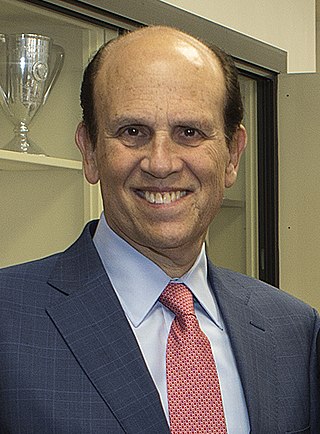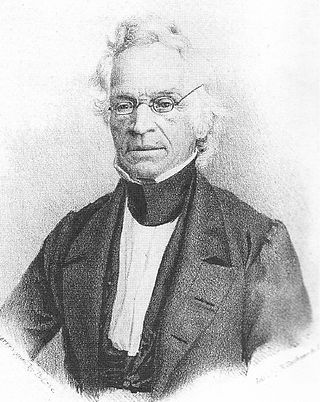Related Research Articles

Michael Robert Milken is an American financier. He is known for his role in the development of the market for high-yield bonds, and his conviction and sentence following a guilty plea on felony charges for violating U.S. securities laws. Milken's compensation while head of the high-yield bond department at Drexel Burnham Lambert in the late 1980s exceeded $1 billion over a four-year period, a record for U.S. income at that time. With a net worth of US$6 billion as of 2022, he is among the richest people in the world.

A leveraged buyout (LBO) is one company's acquisition of another company using a significant amount of borrowed money (leverage) to meet the cost of acquisition. The assets of the company being acquired are often used as collateral for the loans, along with the assets of the acquiring company. The use of debt, which normally has a lower cost of capital than equity, serves to reduce the overall cost of financing the acquisition. The cost of debt is lower because interest payments often reduce corporate income tax liability, whereas dividend payments normally do not. This reduced cost of financing allows greater gains to accrue to the equity, and, as a result, the debt serves as a lever to increase the returns to the equity.

CIBC Capital Markets is the investment banking subsidiary of the Canadian Imperial Bank of Commerce. The firm operates as an investment bank both in Canadian and global equity and debt capital markets. The firm provides a variety of financial services including equity and debt capital market products, mergers and acquisitions, global markets, merchant banking, and other investment banking advisory services.
Kuhn, Loeb & Co. was an American multinational investment bank founded in 1867 by Abraham Kuhn and his brother-in-law Solomon Loeb. Under the leadership of Jacob H. Schiff, Loeb's son-in-law, it grew to be one of the most influential investment banks in the late 19th and early 20th centuries, financing America's expanding railways and growth companies, including Western Union and Westinghouse, and thereby becoming the principal rival of J.P. Morgan & Co.

Drexel Burnham Lambert was an American multinational investment bank that was forced into bankruptcy in 1990 due to its involvement in illegal activities in the junk bond market, driven by senior executive Michael Milken. At its height, it was a Bulge Bracket bank, as the fifth-largest investment bank in the United States.
J.P. Morgan & Co. is an American financial institution specialized in investment banking, asset management and private banking founded by financier J. P. Morgan in 1871. Through a series of mergers and acquisitions, the company is now a subsidiary of JPMorgan Chase, one of the largest banking institutions in the world. The company has been historically referred to as the "House of Morgan" or simply Morgan. For 146 years, until 2000, J.P. Morgan specialized in commercial banking, before a merger with Chase Manhattan Bank led to the business line spinning off under the Chase brand.

Brown Brothers Harriman & Co. (BBH) is the oldest and one of the largest private investment banks in the United States. In 1931, the merger of Brown Brothers & Co. and Harriman Brothers & Co. formed the current BBH.

Brown Bros. & Co. was an investment bank from 1818 until its merger with Harriman Brothers & Company in 1931, to form Brown Brothers Harriman & Co. According to Zachary Karabell:
In its first hundred years, the firm helped to make paper currency standard in the U.S., underwrote the earliest railroad and trans-Atlantic steamship companies and almost unilaterally created the first foreign exchange system between the American dollar and the British pound. In the 20th century, it became a cornerstone of what came to be known as “the Establishment,” as its partners entered the halls of government to shape the global economic and security system that remains the world’s institutional architecture.

Private equity in the 1980s relates to one of the major periods in the history of private equity and venture capital. Within the broader private equity industry, two distinct sub-industries, leveraged buyouts and venture capital experienced growth along parallel although interrelated tracks.

Private equity in the 1990s relates to one of the major periods in the history of private equity and venture capital. Within the broader private equity industry, two distinct sub-industries, leveraged buyouts and venture capital, experienced growth along parallel although interrelated tracks.

Shearson was the name of a series of investment banking and retail brokerage firms from 1902 until 1994, named for Edward Shearson and the firm he founded, Shearson Hammill & Co. Among Shearson's most notable incarnations were Shearson / American Express, Shearson Lehman / American Express, Shearson Lehman Brothers, Shearson Lehman Hutton and finally Smith Barney Shearson.
Crescent Capital Group is a global alternative investment firm focused on below investment grade credit markets with primary strategies that include funds that invest in leveraged loans, high-yield bonds, mezzanine debt, special situations, and distressed securities. The firm has approximately $40 billion of assets under management and has made investments in over 190 companies since its inception as well as expanded into the European market with operations based in London.
Morgan Schiff & Co. was an investment house founded by Phillip Ean Cohen which was a prominent Mergers and Acquisitions and Private Equity firm from its founding in the mid-1980s to the late 1990s. The firm was discontinued after the bankruptcy of Friedman's Inc., the largest jewelry bankruptcy of all time.
Wertheim & Co. was an investment firm founded in 1927 by Maurice Wertheim and Joseph Klingenstein, who met when they worked together at Hallgarten & Company. The firm engaged primarily in the merchant-banking business; it invested from its formation until the deaths of Wertheim and one of his senior partners in 1950 and 1952 respectively.

Trimaran Capital Partners is a middle-market private equity firm formerly affiliated with CIBC World Markets. Trimaran is headquartered in New York City and founded by former investment bankers from Drexel Burnham Lambert. Trimaran's predecessors were early investors in telecom and Internet businesses, most notably backing Global Crossing in 1997. Trimaran also led the first leveraged buyout of an integrated electric utility.
James Herbert Dahl is an American businessman and philanthropist. He was the founder and chairman of Rock Creek Capital, a Jacksonville, Florida-based firm that provided investment services centered on acquiring and managing land in an environmentally responsible manner.

The Predators' Ball: The Inside Story of Drexel Burnham and the Rise of the Junk Bond Raiders, by Wall Street Journal writer Connie Bruck, largely recounts the rise of Michael Milken, his firm Drexel Burnham Lambert, and the leveraged buyout boom they helped to fuel in the 1980s.
Frederick H. Joseph (1937—2009) was the former president and chief executive officer of the investment bank Drexel Burnham Lambert during the 1980s.
Mitchell R. Julis is an American businessman and co-founding partner of Los Angeles hedge fund Canyon Capital Advisors.
Mark N. Kaplan is an American lawyer and business executive who is the former CEO of Drexel Burnham Lambert and senior partner at Skadden, Arps, Slate, Meagher & Flom LLP and Affiliates.
References
- ↑ Markham, Jerry W. (2001). A Financial History of the United States: Volume 2. M.E. Sharpe Inc. pp. 169–70. ISBN 978-0765607300.
- ↑ The Man Who Made Wall Street: Anthony J. Drexel and the Rise of Modern Finance.
- ↑ Den of Thieves . Stewart, J. B. New York: Simon & Schuster, 1991. ISBN 0-671-63802-5.